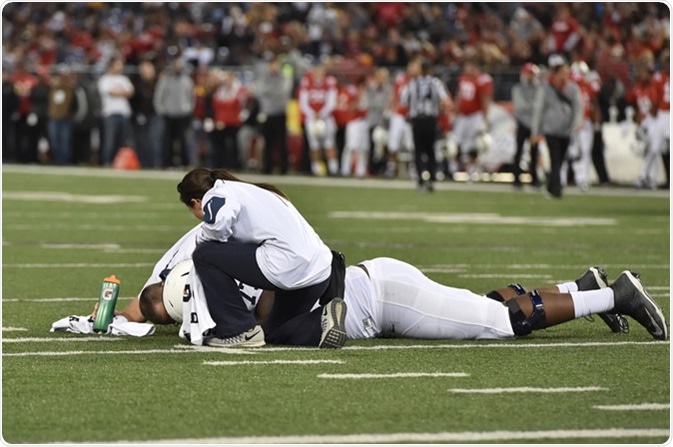Skip to:
A concussion is a mild form of traumatic brain injury that causes temporary loss of normal brain activities. It is usually caused by a blow, jolt, or bump to the head.

BALTIMORE - OCTOBER 24: Trainers tends to an injured Nittany Lion player during the NCAA football game against Maryland October 24, 2015 in Baltimore. Image Credit: Aspen Photo / Shutterstock
What is a concussion?
A sudden jerk to the brain can lead to metabolic and chemical alteration in the brain, as well as stretching and damaging the brain cells. As a result, the brain cells fail to communicate correctly, causing changes in the brain’s normal functionality.
Although concussion is not life-threatening, it can lead to deterioration in cognitive and motor functions. Most commonly, a concussion occurs while playing a contact sport, including football, hockey, rugby, soccer, and boxing.
Sometimes, a person can have a concussion without showing any apparent symptoms. According to the Centers for Disease Control and Prevention, about 3.8 million individuals who are engaged in sport and recreational activities get concussions in the US each year; of these, only a small fraction recognizes the condition and undergoes medical treatment.
What are the signs and symptoms?
In many cases, the signs and symptoms do not appear immediately after a bump; however, the symptoms can be recognizable within hours. The symptoms may last for days, weeks, or more.
The most common symptoms of concussion are headache, amnesia, and confusion. In most cases, an affected person reports having severe headache or pressure in the head. Also, he/she may suffer from nausea, vomiting, dizziness, fatigue, slurred speech, and blurry vision.
It is sometimes difficult for the affected person to recall anything that has happened just before and just after the traumatic head injury. Also, the person may become sensitive to light and noise and can respond to questions slowly.
Some serious neurological problems can occur, such as lack of concentration/attention, memory problems, confusion, sleep disturbance, and temporary loss of consciousness.
Depending on the severity of the symptoms, an affected person can face emotional distress, including anxiety, depression, and panic attacks.
In young children who are unable to describe their problems, a concussion can be recognized by the following symptoms:
- Loss of balance/unsteady posture
- Lack of appetite and altered sleep pattern
- Irritation and crankiness
- Intensive crying
- Appearing confused
- Lack of interest in favorite belongings
- Fatigue
Can concussion be dangerous?
Rarely, a severe jerk to the head can lead to the formation of a hematoma (localized bleeding outside blood vessels). This can result in serious complications that need immediate medical care.
Symptoms indicating a dangerous medical condition with a concussion include repeated vomiting; more than 30 seconds of loss of consciousness; a chronic headache that gradually worsens in severity; behavioral changes; lack of physical coordination; and problems in recognizing people/places.
Also, a severe concussion can be associated with seizures, unusually large pupil size, and repeated or prolonged dizziness.
Repeated head trauma and concussions occurring over a lifetime have been associated with degenerative brain disease.
How can concussion be prevented?
Specific measures can be taken to reduce the risk of concussion. For instance, wearing appropriate protective gear during any sport or recreational activity can be beneficial. While driving a car, one should use seat belts as a preventive measure.
It is also important to educate coaches, athletes, and parents about concussion and its symptoms.
This will help recognize the condition and initiate the treatment immediately. Many youth sports groups now explicitly discourage or ban headshots in sports like soccer, to minimize the risk of acquiring a concussion.
How to diagnose a concussion?
Initially, a doctor takes the detailed medical history of the person or a witness to the head trauma, along with evaluating the signs and symptoms. A doctor can also perform neurological tests to check the vision, hearing, speech, balance, coordination, and reflexes. Also, a neurological test may include analyzing cognitive functions, including concentration, attention, and memory.
In severe cases, a doctor may recommend performing brain imaging tests to check the possibilities of bleeding or swelling inside the skull. The most commonly used imaging tests are head CT scan and MRI.
How to treat a concussion?
The most effective treatment for a concussion is to take complete physical and mental rest. In addition to restricting daily physical activities, one should avoid activities that require thinking, concentration, and attention.
With the improvement of symptoms, one can return to normal daily activities that are not strenuous. It is also essential to get maximum sleep at night.
Before resuming sports activities, one must take advice from the doctor. A doctor usually recommends resuming sports once all the symptoms are gone. A rapid return to sports can increase the chance of another concussion and more severe brain injury.
To provide relief from headaches, doctors usually prescribe mild pain killers; however, medicines that increase the risk of bleeding should be avoided.
What Is A Concussion?
Further Reading
Last Updated: Feb 16, 2021